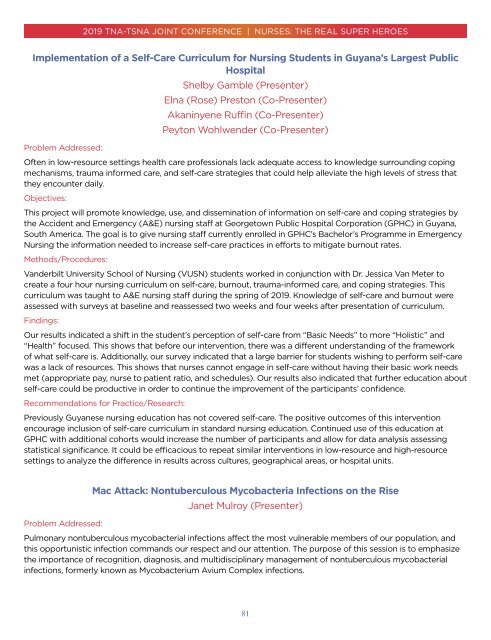2019 Tennessee Nurses Association Book of Reports
You also want an ePaper? Increase the reach of your titles
YUMPU automatically turns print PDFs into web optimized ePapers that Google loves.
<strong>2019</strong> TNA-TSNA JOINT CONFERENCE | NURSES: THE REAL SUPER HEROES<br />
Implementation <strong>of</strong> a Self-Care Curriculum for Nursing Students in Guyana’s Largest Public<br />
Hospital<br />
Problem Addressed:<br />
Shelby Gamble (Presenter)<br />
Elna (Rose) Preston (Co-Presenter)<br />
Akaninyene Ruffin (Co-Presenter)<br />
Peyton Wohlwender (Co-Presenter)<br />
Often in low-resource settings health care pr<strong>of</strong>essionals lack adequate access to knowledge surrounding coping<br />
mechanisms, trauma informed care, and self-care strategies that could help alleviate the high levels <strong>of</strong> stress that<br />
they encounter daily.<br />
Objectives:<br />
This project will promote knowledge, use, and dissemination <strong>of</strong> information on self-care and coping strategies by<br />
the Accident and Emergency (A&E) nursing staff at Georgetown Public Hospital Corporation (GPHC) in Guyana,<br />
South America. The goal is to give nursing staff currently enrolled in GPHC’s Bachelor’s Programme in Emergency<br />
Nursing the information needed to increase self-care practices in efforts to mitigate burnout rates.<br />
Methods/Procedures:<br />
Vanderbilt University School <strong>of</strong> Nursing (VUSN) students worked in conjunction with Dr. Jessica Van Meter to<br />
create a four hour nursing curriculum on self-care, burnout, trauma-informed care, and coping strategies. This<br />
curriculum was taught to A&E nursing staff during the spring <strong>of</strong> <strong>2019</strong>. Knowledge <strong>of</strong> self-care and burnout were<br />
assessed with surveys at baseline and reassessed two weeks and four weeks after presentation <strong>of</strong> curriculum.<br />
Findings:<br />
Our results indicated a shift in the student’s perception <strong>of</strong> self-care from “Basic Needs” to more “Holistic” and<br />
“Health” focused. This shows that before our intervention, there was a different understanding <strong>of</strong> the framework<br />
<strong>of</strong> what self-care is. Additionally, our survey indicated that a large barrier for students wishing to perform self-care<br />
was a lack <strong>of</strong> resources. This shows that nurses cannot engage in self-care without having their basic work needs<br />
met (appropriate pay, nurse to patient ratio, and schedules). Our results also indicated that further education about<br />
self-care could be productive in order to continue the improvement <strong>of</strong> the participants’ confidence.<br />
Recommendations for Practice/Research:<br />
Previously Guyanese nursing education has not covered self-care. The positive outcomes <strong>of</strong> this intervention<br />
encourage inclusion <strong>of</strong> self-care curriculum in standard nursing education. Continued use <strong>of</strong> this education at<br />
GPHC with additional cohorts would increase the number <strong>of</strong> participants and allow for data analysis assessing<br />
statistical significance. It could be efficacious to repeat similar interventions in low-resource and high-resource<br />
settings to analyze the difference in results across cultures, geographical areas, or hospital units.<br />
Problem Addressed:<br />
Mac Attack: Nontuberculous Mycobacteria Infections on the Rise<br />
Janet Mulroy (Presenter)<br />
Pulmonary nontuberculous mycobacterial infections affect the most vulnerable members <strong>of</strong> our population, and<br />
this opportunistic infection commands our respect and our attention. The purpose <strong>of</strong> this session is to emphasize<br />
the importance <strong>of</strong> recognition, diagnosis, and multidisciplinary management <strong>of</strong> nontuberculous mycobacterial<br />
infections, formerly known as Mycobacterium Avium Complex infections.<br />
81

















